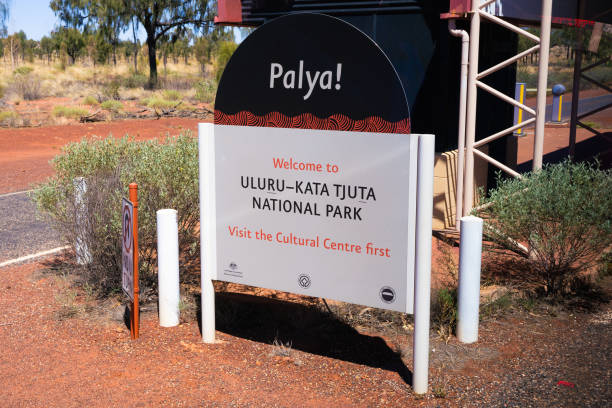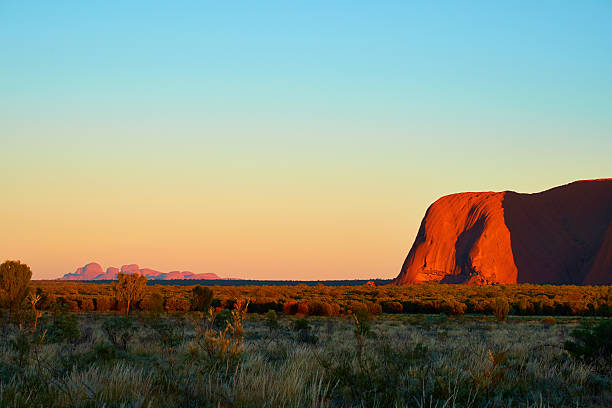At the spiritual core of Australia’s Red Centre, Uluru stands as a colossal emblem of natural wonder and ancient heritage. This article guides you through the awe-inspiring activities and experiences this sacred site has to offer. Embark on a journey that transcends the quintessential ‘tourist’ roadmap as we delve into a 4-day tour of Uluru, blending exploration with education and adventure with awe. From the vibrant hues painting the rock at dawn to the crisp starry skies that crown the night, Uluru invites you to immerse yourself in its timeless beauty. Here, we reveal not just the ‘things to do’, but the heartstring-pull of the outback calling you to discover its secrets.
Understanding Uluru’s Cultural Significance

The Anangu people are the traditional custodians of Uluru, with their connection to the land dating back tens of thousands of years. To the Anangu, Uluru is more than just a landmark; it’s a living cultural landscape, rich with stories, ceremonies, and laws passed down through generations. Visitors are invited not only to witness the beauty of Uluru but also to learn about and respect the Anangu’s way of life. Through this deeper understanding, a visit to Uluru transcends mere sightseeing and becomes an enriching cultural exchange.
While exploring Uluru, it’s crucial to show respect for its sanctity. Climbing the rock itself is forbidden, as it is a deeply sacred act exclusive to the Anangu people during certain ceremonial times. Instead, visitors are encouraged to circumnavigate the monolith, discovering its caves, ancient rock paintings, and waterholes. It’s equally important to observe signage denoting photography restrictions, as some areas are considered too sacred to capture on film. By honoring these customs, we preserve the integrity of Uluru’s sacred sites and show respect for Anangu traditions.
The Best Ways to Experience Uluru’s Majesty
The play of light on Uluru’s surface during sunrise and sunset is an ethereal experience not to be missed. The rock transforms through a palette of fiery reds, deep purples, and soft pinks, telling a unique story with each shade. For the ultimate viewing, set up at Talinguru Nyakunytjaku for a panoramic vista during these magical hours. Arm yourself with a camera and a sense of wonder as you witness this ancient monolith shift and shimmer with the sky.
The Best Vantage Points for Uluru’s Color Transitions
| Vantage Point | Best for Sunrise | Best for Sunset |
|---|---|---|
| Talinguru Nyakunytjaku | Yes | Yes |
| Kata Tjuta Dune Viewing Area | Yes | No |
| Uluru Sunset Viewing Area | No | Yes |
Guided Tours Around the Rock
Embark on a guided tour led by knowledgeable Anangu guides or park rangers to truly understand the stories and significance behind Uluru’s unique features. These captivating walks not only provide insight into Anangu culture and tradition but also highlight Uluru’s flora and fauna. A guided tour enhances the awe-inspiring experience of standing at the base of the monolith, where every step is a story, and every view is a masterpiece of natural artistry.
Walking With Knowledge: Circumnavigating Uluru
The base walk around Uluru is a gentle 10.6 kilometers and takes you through acacia woodlands and grassed claypans. Engage with this sacred space by indulging in an audio guide or joining a group tour. Information stands are dotted along the path, explaining the cultural significance of various sites you’ll encounter. Take the time to absorb the wisdom of the landscape—the stillness, the sounds, and the living traditions that echo around you.
Cultural Tours: Learning the Legends of Uluru
For a more intimate cultural experience, take part in a 4-day tour that combines the physical exploration of Uluru with captivating storytelling from the Anangu themselves. These tours not only include walks and sightseeing but also workshops and demonstrations of traditional practices such as dot painting, weaving, and bush tucker preparation, creating a richly immersive journey.
Adventure Activities in the Uluru-Kata Tjuta National Park
Those seeking a more adrenaline-pumping way to explore will find no shortage of activities in the Uluru-Kata Tjuta National Park. Immerse yourself in the great expanse of the desert on the back of a camel, or take to the skies in a helicopter to see the Australian Outback unfold before you. Stargazing in the clear desert night reveals a celestial display that connects you to the vastness of the universe in ways simply unimaginable in the city.
Camel Tours: A Unique Desert Journey
- Witness the serene early morning desert landscape on a dawn camel ride.
- Enjoy a camel trek at sunset to see Uluru and Kata Tjuta cast in the day’s last golden rays.
Helicopter Rides: A Bird’s Eye View of the Outback
Viewing Uluru from above provides an awe-inspiring perspective on its size and the stunning geological formations that surround it. A helicopter tour offers a thrilling escape into the sky, where the traditional lands of the Anangu and the Majesty of Kata Tjuta unfold beneath you in an incredible patchwork narrative of the living earth.
Stargazing Experiences Like No Other
As the daylight fades, the night sky above Uluru comes alive with millions of twinkling stars. Guided stargazing tours explain the constellations and recount tales of Indigenous astronomy, connecting the stars and the land in a dance of celestial storytelling. This tranquil experience is a profound reminder of our place within the wonders of the cosmos.
Beyond Uluru: Exploring the Surrounding Wonders
Just a short drive from Uluru, Kata Tjuta (The Olgas) promises another mystical experience with its 36 domes rising dramatically from the desert floor. Embark on a hike through the Valley of the Winds, a circuit that weaves between the soaring domes and offers stunning views. Allow yourself to be enveloped by the silence and vastness of this powerful landscape, where each lookout point brings a new and breathtaking perspective.
Venture further afield to Kings Canyon, where ancient sandstone walls have been sculpted over millennia into a stunning array of buttresses, domes, and cliffs. The Rim Walk is a must, leading you to breathtaking views of the Garden of Eden, a lush oasis nestled within the canyon. As you stand atop the canyon’s rim, the sweeping views of the arid wilderness will etch themselves into your memory, adding another layer to your Uluru adventure.
Where to Stay – Accommodation Options near Uluru
Uluru offers a range of accommodation options, from luxurious 5-star resorts to eco-friendly lodges that provide a comfortable base for your adventures. Indulge in spa treatments, dine under the stars, or relax in rooms that offer expansive views of the rock. For those who seek sustainable travel, eco-lodges offer a guilt-free stay with practices that prioritize the environment and cultural respect.
If you prefer a more intimate connection with the land, camping under the Uluru sky is an experience unto itself. Hear the nocturnal life of the outback stir around you and gaze upon the Milky Way, unobstructed by city lights. The campsites offer various facilities to cater to your needs while allowing you to savor the untouched beauty of the desert nightscape.
Essential Tips for a Memorable Uluru Visit
Timing is everything when planning your pilgrimage to Uluru. The cooler months between May and September offer the most pleasant temperatures for exploring. Start your days early to catch the sunrises and plan your afternoons around the golden hours leading up to sunset. Always check the weather forecast and park conditions before setting out on your daily adventures.
What to Pack for Your Outback Adventure
Preparing for your Uluru journey means packing smart. Your suitcase should include lightweight, long-sleeved clothing to shield from the sun, and your backpack should have plenty of water, a hat, sunblock, and a first-aid kit. Be ready for the elements with layers that can combat chilly desert nights and hot days. Also, remember to bring along a spirit of respect and openness to truly embrace the cultural experiences that await you.
Clothing, Safety Gear, and Cultural Considerations
- Lightweight, breathable clothing: Essential for desert heat.
- Sturdy footwear: Ideal for walking on uneven terrain.
- Cultural respect: Awareness of Anangu traditions and customs will enrich your visit.
